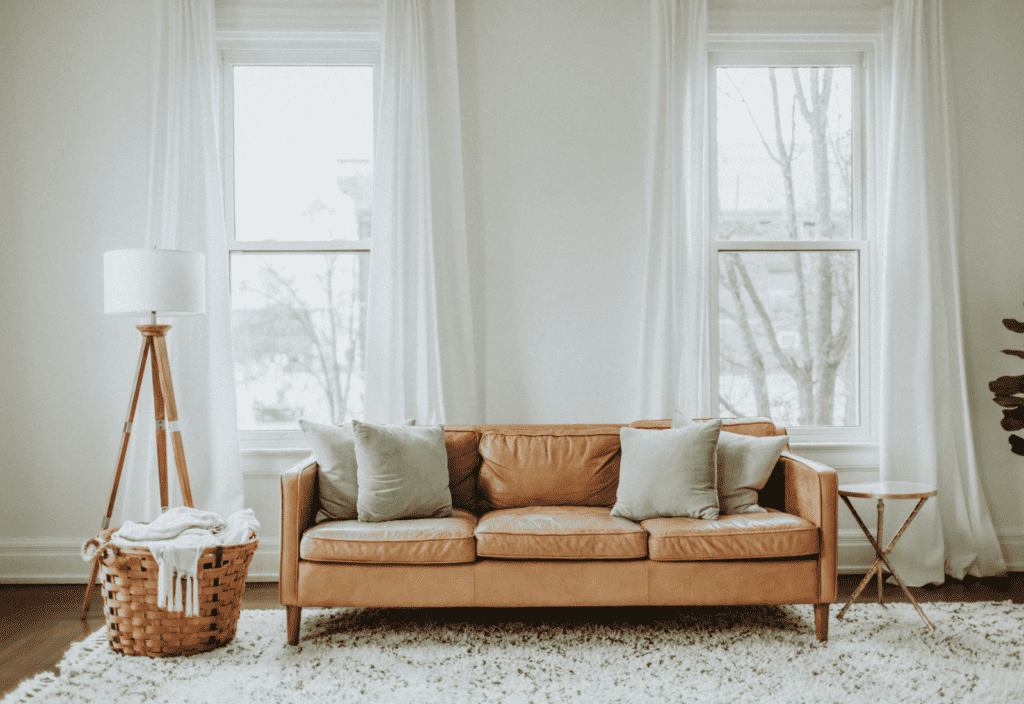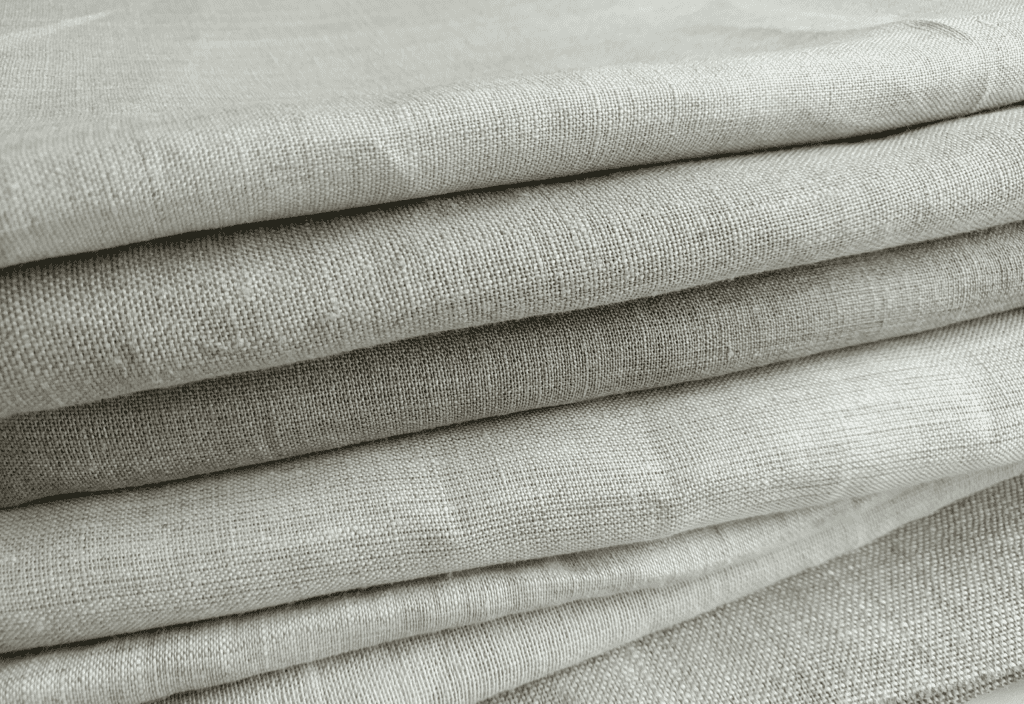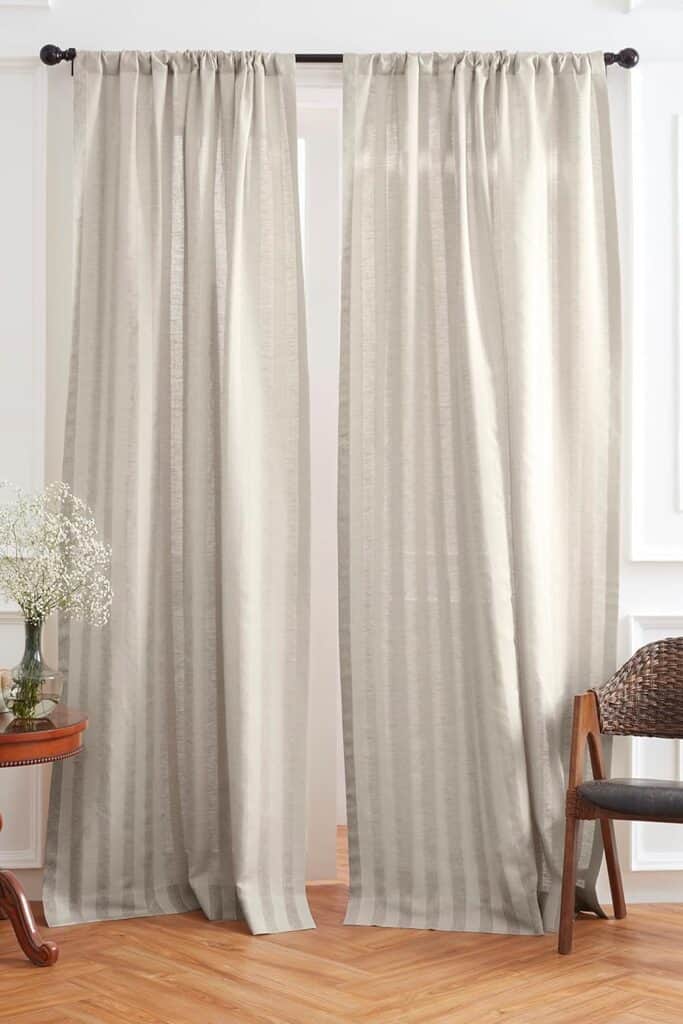As you likely know the toxins in your upholstery, curtains and even bedding can have a negative impact on your home’s indoor air quality. Curtains seem innocent enough, but many contain toxins like PFAS, phthalates and formaldehyde.
When it comes to clean living, natural curtains made of cotton and linen are the way to go.

This post contains affiliate links. At no additional cost to you, I may earn a small commission. Your support is appreciated and makes this blog possible!
The Downsides of Polyester Curtains
The typical curtain is made from polyester, which is essentially a plastic. It is the most popular of all synthetic materials as it’s man-made and cheap to produce.
Polyester derives from coal and petroleum. Like most synthetic fabrics, it is not good for the environment. The manufacturing process includes a substance called antimony. Antimony a carcinogen that is toxic to the heart, lungs, liver, and skin.
Yuckies like perfluorochemicals (PFCs) and formaldehyde are often added to polyester for stain and wrinkle resistance. PFCs accumulate in your body over time and have a link to serious health conditions in humans and animals. PFCs are also forever chemicals that are routinely found in the blood of animals and human beings all over the world.
Low levels of formaldehyde are often added to polyester fabric and even cotton/poly blends to prevent shrinking and wrinkling. It is embedded in a way that it doesn’t easily wash out.
In addition, some curtains contain additional flame retardants, but it is my understanding that this is done most frequently for commercial curtains. Commercial curtains are what you see in public settings like schools, hotels and similar. It definitely never hurts to confirm a curtain does not contain added flame retardants.
To sum it up, many toxins are utilized in the production of polyester fabric. These toxins are detrimental to the health of the workers who manufacture them, the environment and potentially us as well. These toxins make their way into our homes via offgassing.
In addition, polyester sticks around in the environment, since it is a plastic and not biodegradable. If you do decide to go with a polyester curtain, look for some with the OEKO-TEX certification for a little added protection.
Why Choose Natural Cotton Curtains?
Most of my curtains are 100% cotton. I personally love the look and feel of cotton canvas, which is heavier than typical cotton fabric. Cotton canvas is made from a thicker cotton and is woven in a diagonal pattern. It is naturally more stain and wrinkle resistant than plain cotton.
Thankfully, cotton curtains are not too hard to find and aren’t necessarily expensive unless you have them handmade. Cotton is one of the safest fabrics you can choose for curtains, so there is typically little to no off gasing, and cotton manufacturing is more eco-friendly than synthetics.
Why Choose Natural Linen Curtains?
Linen is another lovely and natural fabric. It is a flax-based textile that is made from fibers derived from the stems of the flax plant instead of the bolls that grow around cotton seeds. Linen is favored to cotton in humid climates as it dries quickly helping to reduce heat retention.

Linen is slightly more sustainable than cotton as it uses less water to produce but both are sustainable choices. Organic cotton and linen offer the additional benefit of reduced pesticide use.
Where to Buy Natural Fiber Curtains?
Homemade or Etsy
A simple way to control what’s in your curtains is to simply shop for fabric and make your own curtains or hire someone to make them. If you are like me, hiring is the way to go. My sewing skills start and stop with replacing buttons, ha!
Etsy if a great resource for handmade curtains and other home goods.
LenokLINEN makes beautiful natural linen curtains. Their fabric is OEKO-TEX certified, and they have a Hoffenheim ecological certificate, which is a similar safety assurance.
The Filigree Fern offers lots of cotton and organic cotton handmade curtain options. She is a star-seller with over 10,000 reviews.
The Company Store
The Company Store is a great source for quality home decor including curtains. The first time I ordered from them, I ordered a pink cotton fleece blanket for my daughter’s bed. They accidently sent us a giant king-size blanket.
My daughter’s bed was a twin at the time, but she insisted on keeping it, because she loved it so much. We’ve since moved it to our bed, which is a queen, so it shows under the comforter just a bit on each side, but it’s so warm and soft, we aren’t willing to let go of it either.
The Company Store has selection of organic cotton, cotton and linen curtains.
West Elm/Pottery Barn
West Elm and Pottery Barn are owned by the same parent company, so selection is similar. There is also a Pottery Barn Kids and PB Teen. Both companies have a strong commitment to sustainability. You can find basic cotton, textured cotton and cotton canvas curtains on their websites.
My daughter’s curtains are from Pottery Barn Teen, and they are gorgeous. They are high quality and have held up nicely. If you haven’t shopped at the stores before, you can snag a coupon with an email signup.
Amazon
Amazon can be tricky. It’s often hard to figure out who exactly you are buying from. To be honest, they sell a lot of mass-produced, cheap products from who knows where, and that makes me nervous. This year, I have received two notices stating something I purchased may be “unsafe,” and I’m the most careful person I know!
The first item was for a canvas pencil pouch, My son needed a certain type, and I hadn’t been able to find it so turned to Amazon. I specifically chose it, because it was cotton rather than synthetic. The notice I got stated that the zipper may contain high amounts of lead.
The second notice was for a “natural” mattress I purchased from Overstock about eight years ago that was deceitfully marketed as so. It’s safe to say that I am a little on edge about where I purchase from. Moving on, after searching Amazon, I think I found one pretty good option.
Solino Home offers this beautiful Zoe cotton/linen blend curtain that is made in India. The reviews are excellent, and it seems like great choice. These are pricey curtains in the world of Amazon, but the inconvenient truth is that something being dirt cheap usually isn’t a good sign.
Peri Home has a similar curtain that is OEKO-TEX certified and made of linen. Like Solino Home, it is also made in India. They only have a few rating at the time of this post, but they are favorable.
Budget Option
As I say often, I always want to offer an easily accessible, budget-friendly option, because everyone should feel empowered to live a cleaner, healthier lifestyle. My budget pick for curtains is the Amazon Basics Room Darkening Curtains. These curtains are made of polyester but are OEKO-TEX certified.
Conclusion
I hope you learned something new and possibly found some natural curtains that will work for your specific need. If you are jumping into all things clean living, be sure to check out my related post on organic and natural fiber rugs. Thanks for stopping by!
